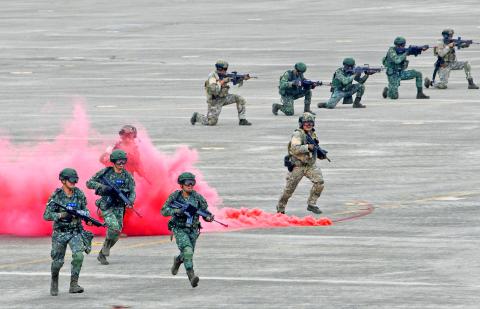The details of a piece of US Senate legislation released on Wednesday revealed calls for US troops to participate in Taiwan’s military exercises and vice versa, a part of efforts by US lawmakers to support Taiwan amid what they see as a rising military threat from China.
The US Senate Committee on Armed Services on May 24 passed the National Defense Authorization Act (NDAA) for fiscal 2019, which includes several provisions aimed at strengthening Taiwan’s military capabilities.
Section 1243 of the act reiterates Washington’s decades-long stance that the Taiwan Relations Act and the “six assurances” are cornerstones of US-Taiwan relations.

Photo: Sam Yeh, AFP
In line with these cornerstones, the US should “strengthen defense and security cooperation with Taiwan to support the development of capable, ready and modern defense forces necessary for Taiwan to maintain a sufficient self-defense capability,” the bill reads.
The US secretary of defense should also promote US Department of Defense policies concerning exchanges that enhance the security of Taiwan, “including US participation in appropriate Taiwan exercises, such as the annual Han Kuang exercise” and vice versa, it says.
The Han Kuang military exercises are Taiwan’s largest annual military drills. They are held in two stages: computer-aided war games and live-fire drills staged nationwide.
This year’s computer-aided war games were held from April 30 to May 4. The live-fire exercises began on Monday and end today.
This year they featured Coast Guard Administration personnel and civilian drone operators for the first time, making use of all levers of national power in military planning, the Ministry of National Defense has said.
The Senate bill calls on both nations to expand cooperation in humanitarian assistance and disaster relief, and urges the secretary of defense to consider supporting a visit by a US hospital ship to Taiwan as part of the US Navy’s annual Pacific Partnership deployment to improve disaster response planning and readiness.
The bill must still be passed by the full Senate and signed by the president before it becomes law.
The US House of Representatives on May 24 passed its version of the fiscal 2019 NDAA.
The US Congress has over the years passed a number of pro-Taiwan laws to show support for the nation, including the Taiwan Travel Act in late February, which encourages meetings and visits by high-ranking US and Taiwanese government officials.
Asked for comment, Presidential Office spokesman Sidney Lin (林鶴明) yesterday expressed the government’s gratitude to the Senate for its support of Taiwan’s national security.
“Taiwan’s national security and self-defense capabilities will continue to be a focus for the government,” Lin said.
Ministry spokesman Major General Chen Chung-chi (陳中吉) also offered thanks to the Senate.
“Taiwan will gladly be a part of endeavors to promote regional security and stability,” Chen said.
Chen quoted Confucius’ saying that “virtue is not left to stand alone. He who practices it will have neighbors,” saying that the ministry believes that Taiwan would be able to work with other democratic nations.

A Ministry of Foreign Affairs official yesterday said that a delegation that visited China for an APEC meeting did not receive any kind of treatment that downgraded Taiwan’s sovereignty. Department of International Organizations Director-General Jonathan Sun (孫儉元) said that he and a group of ministry officials visited Shenzhen, China, to attend the APEC Informal Senior Officials’ Meeting last month. The trip went “smoothly and safely” for all Taiwanese delegates, as the Chinese side arranged the trip in accordance with long-standing practices, Sun said at the ministry’s weekly briefing. The Taiwanese group did not encounter any political suppression, he said. Sun made the remarks when

PREPAREDNESS: Given the difficulty of importing ammunition during wartime, the Ministry of National Defense said it would prioritize ‘coproduction’ partnerships A newly formed unit of the Marine Corps tasked with land-based security operations has recently replaced its aging, domestically produced rifles with more advanced, US-made M4A1 rifles, a source said yesterday. The unnamed source familiar with the matter said the First Security Battalion of the Marine Corps’ Air Defense and Base Guard Group has replaced its older T65K2 rifles, which have been in service since the late 1980s, with the newly received M4A1s. The source did not say exactly when the upgrade took place or how many M4A1s were issued to the battalion. The confirmation came after Chinese-language media reported

The Taiwanese passport ranked 33rd in a global listing of passports by convenience this month, rising three places from last month’s ranking, but matching its position in January last year. The Henley Passport Index, an international ranking of passports by the number of designations its holder can travel to without a visa, showed that the Taiwan passport enables holders to travel to 139 countries and territories without a visa. Singapore’s passport was ranked the most powerful with visa-free access to 192 destinations out of 227, according to the index published on Tuesday by UK-based migration investment consultancy firm Henley and Partners. Japan’s and

BROAD AGREEMENT: The two are nearing a trade deal to reduce Taiwan’s tariff to 15% and a commitment for TSMC to build five more fabs, a ‘New York Times’ report said Taiwan and the US have reached a broad consensus on a trade deal, the Executive Yuan’s Office of Trade Negotiations said yesterday, after a report said that Washington is set to reduce Taiwan’s tariff rate to 15 percent. The New York Times on Monday reported that the two nations are nearing a trade deal to reduce Taiwan’s tariff rate to 15 percent and commit Taiwan Semiconductor Manufacturing Co (TSMC, 台積電) to building at least five more facilities in the US. “The agreement, which has been under negotiation for months, is being legally scrubbed and could be announced this month,” the paper said,